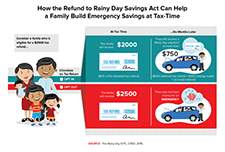One of the core findings of the US Financial Diaries is the prevalence of income volatility. On average, our households experience six months when income is 20% above or below their typical monthly income. In theory, households should react to volatile incomes by building up savings in months where income is higher than normal and using that cushion to smooth consumption during the months where income is lower. The very nature of volatile and unpredictable incomes, however, may make this strategy difficult to implement. The assumed “emergency” in emergency savings advice is usually the loss of a steady job, by implication an in frequent occurance. But households in our survey experience smaller, more frequent, shortfalls in income. These smaller “emergencies” may require them to regularly draw down emergency savings.
Income Gains and Month-to-Month Income Volatility: Household evidence from the US Financial Diaries


